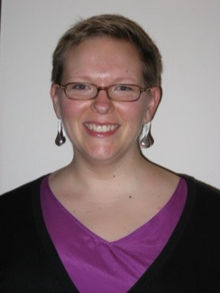“Editing Wikipedia is an enormous responsibility — one that I welcome,” says Ingrid Haugen.
Word had made its way to Ingrid in 2011 about the Association for Psychological Sciences Wikipedia Initiative — a project calling upon APS members to improve the information available on Wikipedia about pyschology-related topics, either by editing themselves or by asking their students to edit. Ingrid had been hoping that one of her classes at Roosevelt University in Chicago would participate in the APS initiative, so that she could learn how to edit Wikipedia. She got her wish in her final term before she graduated, when she took Lisa Lu’s course Brain and Behavior, which was participating in the APS initiative and the Wikipedia Education Program.
Professor Lu identified several articles about psychology related to brain and behavior on the English Wikipedia that needed improvement, and asked students to pick ones they were interested in working on, then assigned small groups to articles based on their selections. Ingrid was particularly interested in learning more about electroencephalography techniques, so she was glad to be assigned to the article Mu wave.

“I really enjoyed using code to add references, wikilinks, images, and so on,” Ingrid says. “I realize that most of my classmates found the code to be sufficiently opaque so that they had trouble using it effectively, but I found it engaging.”
Because she became so hooked on Wikipedia editing, Ingrid took the lead with her group — adding most of the content to Wikipedia, rewriting sections to achieve similar style and tone throughout the article, and interacting with editors, which she had been nervous about.
“After learning about edit wars and so on, I was unsure of how our edits would be received,” she explains. “I was relieved to find that the editors who had been following our article were interested in seeing us succeed more than anything else. One editor in particular, Tryptofish, was very active and helpful. This editor actually performed an article merge for us; the merge had been discussed on Mu wave’s talk page but I was nervous about executing it myself. This same editor gave me an editor’s barnstar when our project was completed. Receiving the barnstar actually inspired me to submit the article for the Good Article review process. I have found the community of editors to be intelligent, dedicated, and helpful.”
With input from classmates, Online Ambassador Smallman12q, and other editors, Ingrid set out making the article better throughout the duration of her course. In mid-December, Mu wave passed the Good Article review process.
“Almost every aspect of the project involved new skills, from finding secondary sources to dealing with computing code,” Ingrid says. “That made it challenging, and I enjoy challenges because they mean that I am learning a great deal by meeting them. It was exciting, if a bit intimidating, to make our writing immediately available to anybody with an internet connection. Unlike a traditional project that might never be read again after it is graded, the fruits of this assignment have the potential to live on and make a real contribution to the popular conception of the area each group addressed.”
And, she says, “it is deeply satisfying to see my work come up in a Google search, something that would never happen as the result of a term paper. To know that anybody who is curious enough about mu waves to conduct an internet search will be able to click on my article if they so choose is very exciting.”
Since completing her coursework and graduating, Ingrid has continued to make minor edits to articles, something she intends to keep doing. She says the Wikipedia assignment enabled her to feel capable of contributing something valuable to Wikipedia, and she will continue looking for opportunities to do so. She even holds out hope to have another Wikipedia assignment in a future course; she intends to keep pursuing her studies in social neuroscience at the Ph.D. level.
“I think that Wikipedia assignments are a fantastic way for students to become accustomed to thinking of themselves in a worldly, professional context rather than as on an island of very local influence,” she says.
For other examples of good work from editors in the Wikipedia Education Program, please see the trophy case.
LiAnna Davis
Wikipedia Education Program Communications Manager

Can you help us translate this article?
In order for this article to reach as many people as possible we would like your help. Can you translate this article to get the message out?
Start translation